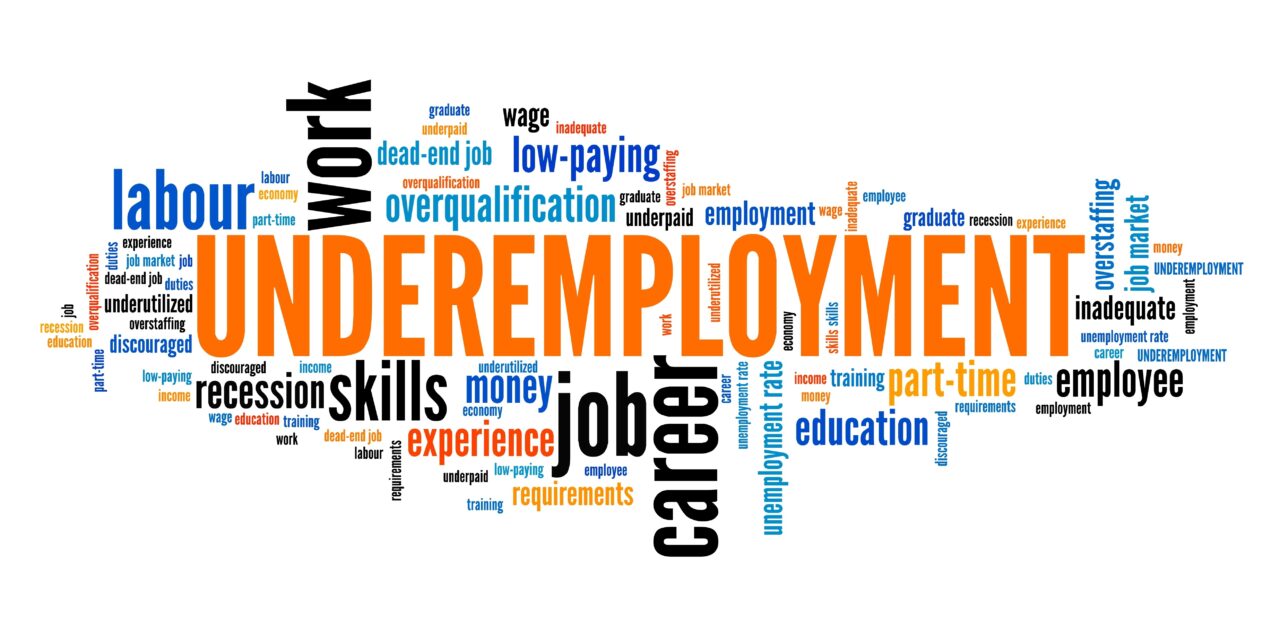In the months leading to graduation, many college students all experience similar fears—what to do, where to go, which job is best, etc. However, a new, frightening trend called “underemployment” may make your preconceived anxieties about leaving college for the “real world” even worse.
Underemployment is “the condition in which people in a labor force are employed at less than full-time or regular jobs or at jobs inadequate with respect to their training or economic needs.” In other words, college graduates often land jobs that don’t match their educational qualifications, pushing them into amateur roles for which they may be overqualified for.
What This Means for People Completing Their Degrees
As of September 2024, about 40% of recent college graduates are underemployed, working in jobs that typically don’t require a college degree. This can have detrimental impacts on students’ career trajectory, financial strain, skill mismatch, and mental health.
Starting a career in a role that doesn’t require a college degree can hinder long-term career growth. Graduates who start their careers underemployed often remain underemployed even a decade later. In addition, underemployment often results in lower wages, leading to financial instability.
Working in a job that doesn’t utilize your top skills and education can caused skill atrophy, making it harder for recent graduates to transition into roles that match their qualifications. These factors, in addition to the stress and frustration of being underemployed, negatively impact mental health and career success.
Despite these possible strains, certain degrees have lower rates of underemployment, and being aware of this issue already sets you up for greater success. The Federal Reserve Bank of New York recently provided a roundup of the underemployment degrees list as well as the most employed majors.
Based on the latest release, the fields with the lowest underemployment rates are nursing, education, and engineering.
SDSU Global Campus Programs to Avoid Underemployment
SDSU Global Campus offers several online programs with lower rates of underemployment for graduates. Let’s dive into the fields of computer engineering, civil engineering, and electrical engineering, and how these paths set you up to avoid the possibility of underemployment:
Computer Engineering
Computer engineering has the 3rd lowest underemployment rate, coming in at 13.3%. For reference, the highest levels of underemployment are upwards of 60 to 70%.
The online Master’s in Computer Engineering program focuses on emerging technologies and provides a research-intensive environment. The curriculum includes courses on machine learning, computer networks, and embedded systems.
With a growing reliance on mobile technology and tech start-ups, graduates from this program are in high demand. Our program prepares students for roles in both hardware and software engineering, with numerous job openings projected annually.
Civil Engineering
Civil engineering degrees come in at 15.9%, making it the 5th lowest degree for underemployment.
Our online Bachelor’s in Civil Engineering degree completion program is designed to fast-track students into successful engineering careers. The program includes hands-on surveying experience and courses developed by expert instructors.
Graduates work in various fields such as construction, urban development, and public policy. The program boasts a high employment rate, and graduates find roles in both the public and private sectors.
Electrical Engineering
Electrical engineering has the 13th lowest underemployment rate at 20.9%.
The online Master’s in Electrical Engineering program is designed for working professionals, offering flexibility and a curriculum that covers advanced topics in communications, digital signal processing, and energy systems.
Graduates from this program are well-prepared for high-demand roles in various industries, with a median annual salary of $106,950 and a projected industry growth of 9% over the next ten years.
Make the Right Choice!
Underemployment is a significant concern for recent college graduates, but choosing the right degree can help mitigate this risk. Our programs in computer engineering, civil engineering, and electrical engineering prepare students for successful careers with lower rates of underemployment. Explore these programs to set yourself up for a bright and stable future!
